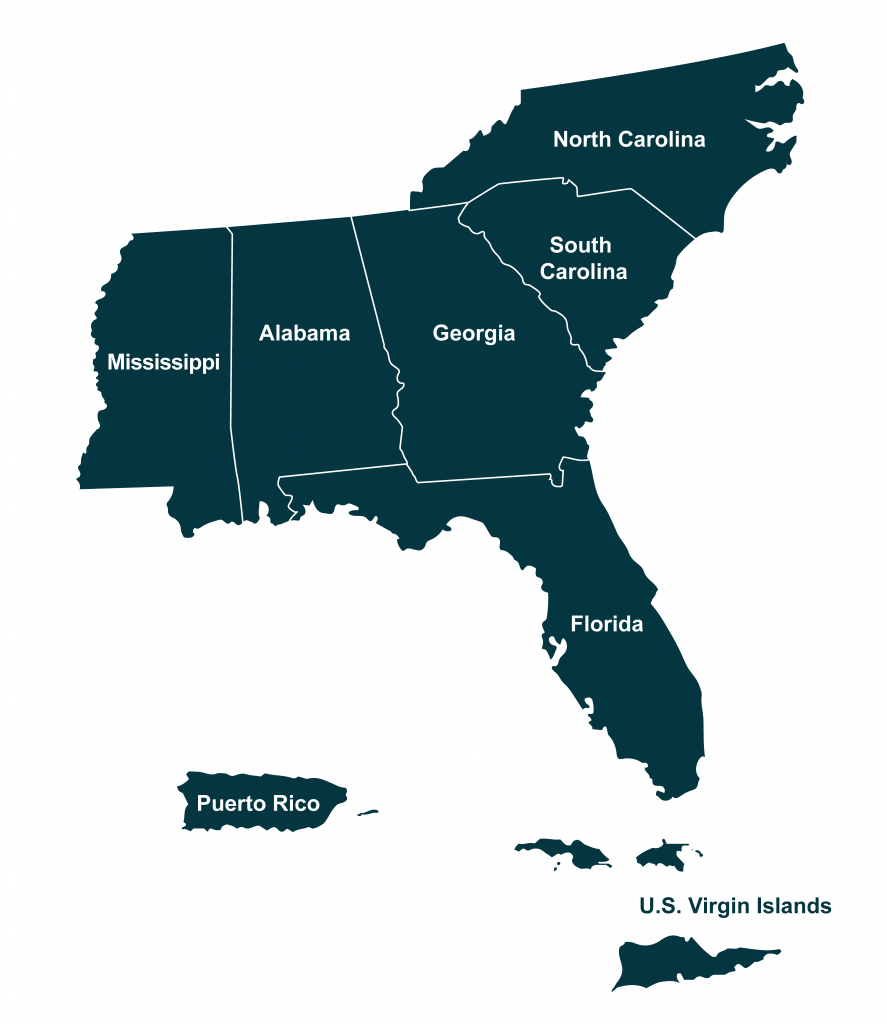Climate Change impacts on human exposure: Addressing Agriculture, Forestry and Fishing populations in the Southeast U.S and Caribbean
This funding opportunity seeks to advance the understanding of extreme heat, sea level rise, and natural disasters effects on AgFF communities. The Southeast Coastal Center for Agricultural Health and Safety (SCCAHS) is requesting applications from academic and research institutions for pilot projects that address translational research – successfully translating research into interventions, health promotion/prevention programs or policy or behavioral changes in communities.
The purpose of this funding mechanism is to provide a new opportunity and resources to support innovative, collaborative research relevant to the health challenges and disparities faced by Southeast U.S. and Caribbean workers in agricultural, forestry and fishing industries. An area of interest for all proposals will be the involvement of translation of knowledge into community based health or healthcare through pilot studies which generate critical preliminary data that will help to obtain extramural funding.
Criteria Used to Assess Awards
Proposals will be sent to qualified experts for review. Reviewers will follow NIH guidelines (i.e. Overall Impact, Significance, Investigators, Innovation, Approach, and Environment). Scoring is scaled 1-9 with 1 being the highest impact score. An overall impact score is the primary criteria for funding decisions.
Additional Review Criteria include the potential for future funding in a larger extramural grant (scored on a 1-9 scale) and transdisciplinary research approach (reviewer comments are solicited but not scored).
Funding Guidelines
Funding for successful applications can be initiated as soon as appropriate IACUC and IRB approvals are obtained.
Progress and final reports regarding grant applications, as well as annual updates thereafter are required from awardees as part of CDC/NIOSH reporting requirements and are due 60 days after the end of the funding period.
Funding may be used for any direct research expenses and conference/meeting travel expenses. The maximum award amount per recipient is $30,000 (direct costs).
Facilities and Administrative (indirect) costs are limited to 25%.
Subcontracts are NOT allowed.
Eligibility
- Applications from early-stage investigators Postdoctoral Fellows, Instructors, Assistant Professors are encouraged and prioritized.
- Established investigators who are working in other fields, but are interested in exploring new directions in translational research may apply.
- Volunteer faculty and adjunct faculty are NOT eligible to serve as PIs but may be coinvestigators.
- Pilot projects should include a qualified mentor and mentoring plan where appropriate.
- To ensure that Pilot Project funds are distributed equitably, a PI, once funded, is not eligible to submit a new application for 1 year after receiving funding.
- Community-based organizations, can apply as a co-investigators. If you are a community member and have an idea for a research proposal, please contact Farah Arosemena for more information about partnering with a prospective PI to apply: farah.arosemena@ufl.edu
Letter of Intent
A letter of intent (LOI) is required and will be reviewed. Only applicants who have submitted a LOI and who are invited to apply for the full pilot grant will be eligible. The LOI should include:
- Project Title
- PI Contact information (name, affiliation, phone and email)
- Other key personnel information (name, affiliation, role)
- Briefly address significance, community relevance, research design and timeline.
Please submit a Letter of Intent to farah.arosemena@ufl.edu by June 26, 2023 as a single PDF file attachment. Those selected for submitting a full proposal will receive an email invitation.
Deadlines/ Important Dates
| Item | Dates* |
| Letter of Intent Due Date | June 26, 2023 |
| Project Proposal Due Date | July 31, 2023 |
| Review of Proposals | August 1-30, 2023 |
| Earliest Anticipated Start Date | September 30, 2023 |
*Dates may need to be revised if administrative/IRB issues delay the start date for the proposal.
Application Format
- Page Size: 8.5 X 11 inches
- Margins: 0.5”
- Font: Arial 11‐point
- Maximum of 6 pages including cover page.
Documents to Include:
- Cover page (Title, PI and list of co-Is, including institutional affiliations) (1 page)
- Abstract (300 words maximum) (1 page)
- Specific aims (1 page)
- Significance, Innovation, Approach, Future funding plans/goals (3 pages)
- Biographical Sketch: Include one for each PI and co-Investigator. A mix of Center members and non-members is accepted. Following NIH format, including past training and academic appointments followed by a short paragraph on research expertise and role in the project. List up to 15 relevant publications. Biosketches may not exceed 5 pages for any investigator.
- References: Literature cited, no limit.
- Itemized Budget Research and Related Budget form: click here for PDF | click here for fillable form
- Budget justification: Please follow the CDC guidelines for the budget narrative – https://www.cdc.gov/hiv/pdf/funding/announcements/ps15-1509/ps15-1509-budget-preparation-guidelines.pdf
*Biosketches, budget items, and references do NOT count towards the 6 pages, and all items should be submitted as one single PDF.



